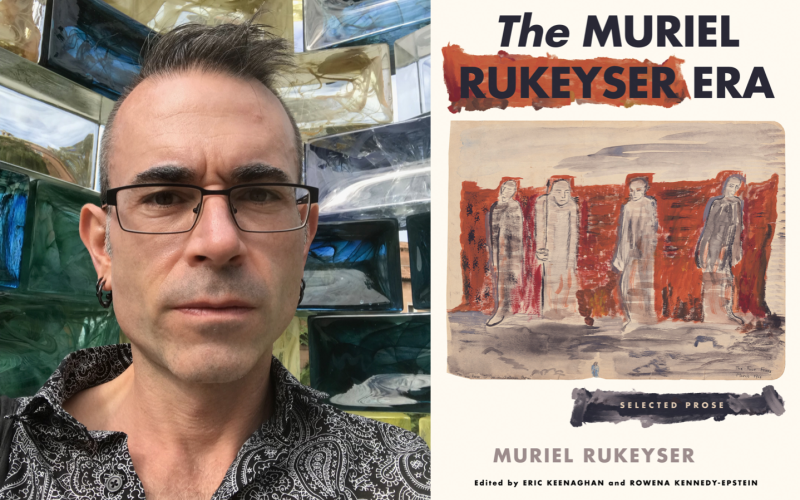English Professor’s Book Recovers Poet-Activist Muriel Rukeyser’s Uncollected, Unpublished Prose

By Bethany Bump
ALBANY, N.Y. (March 26, 2024) — More than 10 years ago, Eric Keenaghan was asked to give a talk about queer poet-activist Muriel Rukeyser for a public lecture series called Jews Along the Hudson.
While Rukeyser was known primarily as a feminist, leftist poet during the mid-20th century, Keenaghan, a UAlbany English professor who had been interested in Rukeyser since college, wanted to know more about her life apart from her poetry. So he applied for a grant to dig into her archives at the Library of Congress and found a large body of experimental nonfiction and critical writings, including essays, lectures, radio scripts, stories and reviews.
“The whole time I’m thinking, this prose has got to get out there,” said Keenaghan, who currently chairs the English department. “I realized she’s a mystery. That deep dive basically revealed how much no one knows about her and how much hasn’t been published. And that just got me going.”
His interest led him to collaborate with Rowena Kennedy-Epstein, a fellow Rukeyser scholar and professor at the University of Bristol, on a book of previously uncollected and unpublished Rukeyser prose. The Muriel Rukeyser Era: Selected Prose was published in November by Cornell University Press and has been generating buzz among Rukeyser fans and those interested in American leftist, poetry and modernist literary studies.
Born in New York City in 1913, Rukeyser became involved in activist spaces while attending Vassar College in Poughkeepsie. She experienced early literary success after her first book of poems was selected for publication in the Yale Younger Poets Series in 1935 and cemented her name as an activist poet in 1938 with the publication of The Book of The Dead, about the Hawk’s Nest Tunnel disaster and the men who developed fatal lung disease at the West Virginia mining site.
Her reputation continued to grow throughout the 1940s, as did her commitment to anti-fascism, which she had been passionate about since witnessing the outbreak of the Spanish Civil War while covering the Popular Olympics in Barcelona in 1936.
But reception to Rukeyser and her leftist positions began to cool and her work was actively suppressed by the 1950s, as anti-communist sentiments in post-war America gave rise to the Red Scare and blacklisting of suspected sympathizers. Rukeyser suspected she was being surveilled by the FBI.
“There's this period in the ‘50s where she disappears and past critics and editors of her work have said — and these are entirely false narratives — that she went underground, that she stopped writing poetry and she stopped producing,” Keenaghan said. “But the fact is she was still producing and producing a lot more than we probably even know or have found.”
During his trips to the archives, Keenaghan found work from this period that he believes was Rukeyser’s written under a pseudonym.
“It wasn’t uncommon, especially during the Red Scare, for authors to use a pseudonym,” he said. “And here we have a queer, Jewish, leftist writer and woman. She was continually publishing or working toward publication, but some things may have never seen the light of day and other things were actively suppressed.”
Rukeyser enjoyed renewed appreciation in the 1960s and 1970s as anti-war and social justice movements took hold, but she remained controversial even to some on the left, who felt her politics and work were too radical.
To Keenaghan, who sees parallels between the rising fascism of Rukeyser’s time and today, the poet’s work remains as relevant as ever. In particular, a five-lecture series she delivered at Vassar College in 1940, titled “The Usable Truth” asks timeless questions about the nature of poetry and invites writers to use their work in service of anti-fascism.
“She calls upon her audience to recognize their responsibility for using the arts — and she talks about film, poetry, theater — to cultivate a strong sense of human unity to oppose injustice of all kinds,” he said.
Keenaghan will deliver several talks about Rukeyser and his new book in the coming months. On April 8, he will deliver a talk from 6-8 p.m. for National Poetry Month at the Bethlehem Public Library about Rukeyser’s Vietnam-era poetry and activism (pre-register here). On April 25, he will appear with his co-editor, Kennedy-Epstein, in a special webinar series called “Made at the Library” from noon to 1 p.m. about the making of the book. The webinar is hosted by the Library of Congress, where the majority of Rukeyser’s papers are archived. On June 12, he will deliver a talk about Rukeyser, sponsored by OutHudson for Pride Month, from 6-7:30 p.m. at the Hudson Area Library.




